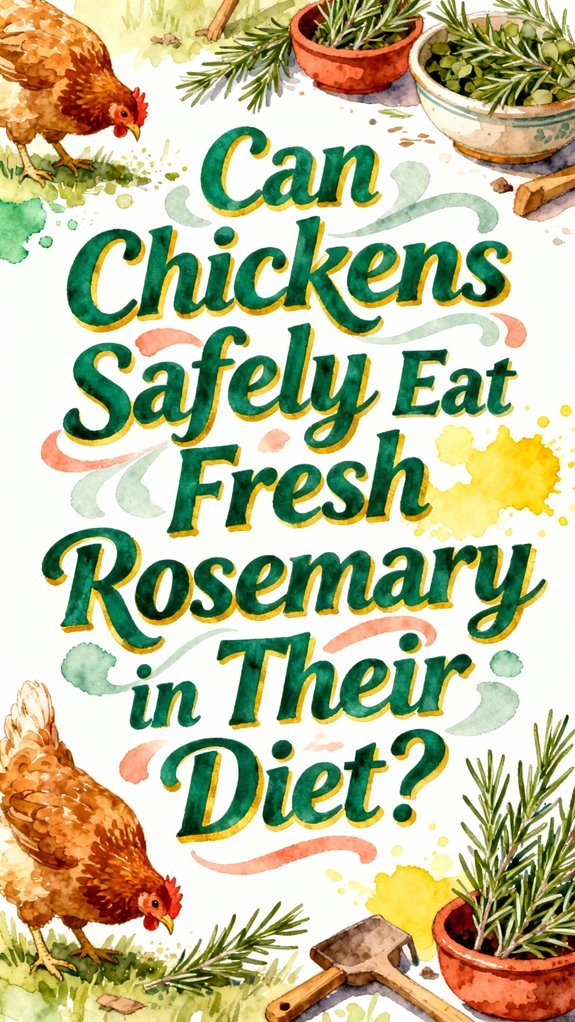You can safely feed zucchini to your chickens as a nutritious treat containing essential B vitamins, vitamins A, C, and K, plus minerals like potassium and iron. Cut the vegetable into manageable chunks, removing tough peels to prevent crop impaction, and limit portions to 10% of their daily diet. Serve it raw or lightly cooked, 1-2 times weekly, while maintaining their primary feed as 90% of intake. Understanding proper preparation methods and portion control guarantees maximum benefits for your flock.
The Nutritional Benefits of Zucchini for Chickens
While many backyard chicken keepers focus on traditional feed options, zucchini offers a remarkable array of essential nutrients that can considerably enhance a chicken’s diet. You’ll find it’s packed with B complex vitamins that support metabolic processes, alongside vitamins A, C, and K that boost immune function and bone health. The vegetable’s high fiber content optimizes vitamin absorption and promotes digestive efficiency through improved gut motility. Only 10 percent of your chickens’ total calories should come from treats like zucchini, with the remaining 90% from complete chicken feed. Your flock will benefit from zucchini’s rich mineral profile, including potassium for muscle function, calcium for egg production, and iron for oxygen transport. The combination of antioxidants and fiber benefits creates a dual-action approach to health maintenance, supporting both cellular protection and digestive wellness. As a low-calorie, water-rich food, zucchini provides these nutrients without risking obesity in your chickens.
Safety Guidelines for Feeding Zucchini to Your Flock
When introducing zucchini to your flock’s diet, adherence to specific safety protocols secures peak health outcomes and minimizes potential risks. You’ll need to begin with small portions and monitor your chickens’ responses carefully.
Proper zucchini storage in cool, dry conditions prevents mold growth, while prime feeding timing should align with your birds’ regular meal schedule. You’ll want to cut the zucchini into manageable pieces and remove any tough peels that could cause crop impaction. Don’t add seasonings, oils, or other additives – serve it plain, either raw or cooked. The vegetable’s high water content helps prevent dehydration during hot weather. The natural deworming properties of zucchini make it an excellent addition to your chickens’ diet.
Watch for signs of digestive issues and ascertain zucchini remains a supplement rather than a primary food source. Always inspect for contaminants, including pesticides or chemical residues, before offering it to your flock.
Best Ways to Prepare Zucchini for Chickens
Because zucchini preparation methods directly impact chicken consumption and nutrient absorption, selecting the best approach is essential for your flock’s health. You’ll find both raw and cooked preparations effective, with raw maintaining maximum nutrients while cooking enhances accessibility. When serving raw, cut the zucchini into manageable chunks and score the skin to facilitate pecking. For cooked options, steam or lightly boil to preserve nutritional value while increasing digestibility. Consider baking at 425°F for 30 minutes if preparing larger batches for your chickens.
Size your pieces according to your flock’s age and preferences, ensuring uniform cuts to prevent selective feeding. You can hollow out zucchini shells and stuff them with other vegetables to increase interest. Don’t forget about zucchini blossoms – they’re rich in antioxidants and can complement your feeding program when introduced gradually. Present these preparations during warmer months to maximize hydration benefits.
Zucchini’s Role in Supporting Egg Production
Through its diverse nutrient profile, zucchini plays an essential role in supporting ideal egg production. You’ll find that zucchini’s vitamin C content, at 18% of daily intake per 100g, strengthens your hens’ immune systems, while its vitamin A (6.7% DV) enhances metabolic processes vital for egg development. The vegetable’s B6 content supports nervous system function, directly impacting laying consistency.
The zucchini benefits extend to egg quality, with its antioxidants contributing to richer yolk coloration and enhanced nutrient density. Your hens will receive essential minerals like calcium for stronger shells and potassium for improved electrolyte balance. The high water content (95%) helps maintain hydration levels, particularly beneficial during warm weather when egg production can be challenged. These combined factors make zucchini a valuable dietary component for maintaining consistent, high-quality egg production. Serving the vegetable by cutting in half makes it easier for chickens to consume while maximizing nutritional benefits.
Understanding Portion Control and Feeding Frequency
Despite zucchini’s nutritional benefits, proper portion control remains critical for maintaining your chickens’ dietary balance. Limit zucchini to 10% of their daily diet, ensuring 90% comes from complete chicken feed for essential nutrients. You’ll want to serve it just once or twice weekly to prevent digestive issues. The omega-3 fatty acids in zucchini provide additional nutritional value when included as part of a balanced diet.
For ideal portion control, cut zucchini into manageable pieces or halves, allowing birds to peck without overeating. You can serve it raw or cooked, but avoid adding rich ingredients. When managing feeding frequency, provide zucchini early in the day and divide portions for larger flocks to prevent dominant birds from overconsuming. Remember that baby chicks under 6 weeks shouldn’t eat zucchini, while older chicks need careful introduction with limited portions.
Signs Your Chickens Are Enjoying Their Zucchini
Attentive chicken owners can spot clear behavioral indicators when their flock enjoys zucchini treats. You’ll notice immediate zucchini acceptance through sustained pecking, enthusiastic consumption, and competitive behavior around the food source. Your chickens will actively tear at the flesh and seeds while making content vocalizations. Just like with mineral-rich dandelions, chickens demonstrate natural foraging instincts when exploring new healthy foods.
Watch for positive feeding behavior such as group gathering, increased scratching activity, and thorough consumption of all zucchini parts including peel and flowers. You’ll observe improved physical vigor post-feeding, enhanced feather condition, and steady egg production. Similar to how they enjoy eating fresh raw broccoli, your chickens may eagerly peck at zucchini pieces. Your flock may display social feeding patterns where experienced birds encourage younger ones to participate. These signs, combined with increased water intake and absence of digestive issues, confirm that your chickens are benefiting from and enjoying their zucchini supplementation.
Seasonal Benefits of Adding Zucchini to Chicken Feed
While zucchini provides year-round benefits for chickens, its seasonal advantages become particularly significant during summer months. You’ll find that zucchini’s 95% water content offers vital seasonal hydration support, helping your flock maintain ideal body temperature during heat stress periods. The vegetable’s potassium and other electrolytes enhance cellular function when temperatures rise.
You can support your chickens’ digestive balance through zucchini’s high fiber content, especially important during seasonal feed shifts. Its antioxidants, including vitamin C and beta carotene, strengthen immune responses during environmental changes and seasonal stressors. The timing works perfectly, as zucchini’s peak growing season aligns with when chickens need additional hydration and nutritional support. You’ll also benefit from zucchini’s abundance during summer and early fall, making it a practical seasonal supplement. Growing zucchini in container gardens can provide a steady supply of this nutritious vegetable for your chickens.
Comparing Zucchini to Other Healthy Chicken Treats
Three key factors distinguish zucchini from other healthy chicken treats: its balanced nutrient profile, high palatability, and versatile feeding options. While vegetables like broccoli and bell peppers offer high antioxidants, your chickens’ zucchini preferences often favor its mild taste and soft texture. Unlike sweet potatoes’ higher carbohydrate content, zucchini provides a broader spectrum of vitamins A, C, and K, alongside essential minerals like potassium and manganese. Similar to asparagus varieties, zucchini offers a safe and nutritious addition to your chickens’ treat rotation. Like sulfur compounds in broccoli, zucchini should be fed in moderation to prevent digestive issues.
You’ll find zucchini’s unique deworming properties through its seeds set it apart from other vegetable variety options. Its high water content matches cucumbers for hydration benefits, while its flexible serving methods – raw, sliced, or grated – encourage natural foraging behaviors. When combined with other treats like peas for protein or carrots for beta-carotene, zucchini complements a diverse feeding strategy. Gradually introducing vegetables to your flock helps prevent any potential digestive issues while they adjust to new treats.
Managing Zucchini Garden Surplus Through Chicken Feeding
Once your zucchini plants reach peak production, you’ll likely face the common gardener’s dilemma of surplus harvest management. Rather than letting excess produce go to waste, transform your abundant zucchini into nutritious chicken treats through strategic feeding techniques.
You can implement effective zucchini storage by processing larger fruits into bite-sized pieces, which extends usability and prevents spoilage. Slice or dice raw zucchini for immediate feeding, or halve oversized specimens for chickens to peck out the flesh. For maximum utilization, incorporate the entire plant by offering leaves and stems, which chickens willingly consume. Like with vitamin-rich cabbage, feeding fresh vegetables helps provide essential nutrients while avoiding waste. Chickens initially display cautious approach to food but gradually build excitement when presented with fresh greens.
Just as natural foraging behavior enhances poultry health, offering zucchini supports their instinctive feeding patterns. This approach creates a sustainable garden-to-coop cycle, reducing feed costs while providing enrichment activities. Your chickens will benefit from zucchini’s vitamins A and C, potassium, and natural hydration properties.
Health Monitoring When Adding Zucchini to Diet
Since introducing zucchini into your chickens’ diet represents a significant nutritional change, implementing a systematic health monitoring protocol becomes crucial. You’ll need to track key health indicators while making these dietary adjustments, including egg production, shell quality, and plumage condition. Monitor your flock’s wellness levels and observe their droppings for signs of improved parasite control or digestive issues. Just as with apple feeding safety, removing seeds and potential hazards is essential when introducing any new food to your flock. Unlike spicy foods which chickens process through their unique capsaicin tolerance, zucchini requires careful monitoring for digestive acceptance.
Watch for potential risks by checking for adverse reactions and maintaining proper hydration. You’ll want to start with small amounts of raw zucchini while documenting health observations such as weight changes and behavioral patterns. Keep detailed records of your birds’ responses to the new food, and verify they’re receiving a complete nutritional profile. If you notice unusual symptoms after adding zucchini, consult a poultry health expert promptly. Ensure that your chickens always have access to fresh clean water alongside their zucchini treats.







